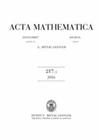史瓦西解对引力扰动的线性稳定性
IF 6.7
1区 数学
Q1 MATHEMATICS
引用次数: 153
摘要
我们在本文中证明了广义相对论中著名的史瓦西家族黑洞的线性稳定性:由正则初始数据引起的围绕史瓦西度规的爱因斯坦真空方程的线性化解在黑洞外部保持全局有界,并且实际上衰减为线性化的克尔度规。我们用合适的双零规来表示方程。为了得到衰减,实际上必须加入一个残余纯规范解,我们证明它本身是由初始数据定量控制的。我们的结果进一步包括Teukolsky方程通解的衰减陈述(由规范不变的零分解曲率分量满足)。这些后一种表述实际上是在证明过程中通过利用满足Regge- Wheeler方程的相关量推导出来的,对于Regge- Wheeler方程,适当的衰减可以通过调整先前关于线性标量波动方程的工作轻松获得。线性化Kerr衰减速率的界限是逆多项式,这表明色散足以在非线性稳定性的潜在未来证明中控制爱因斯坦方程的非线性。这篇论文是独立的,包括从双零规表示的全非线性爱因斯坦真空方程推导出绕史瓦西的线性化重力方程的物理空间推导。本文章由计算机程序翻译,如有差异,请以英文原文为准。
The linear stability of the Schwarzschild solution to gravitational perturbations
We prove in this paper the linear stability of the celebrated Schwarzschild family of black holes in general relativity: Solutions to the linearisation of the Einstein vacuum equations around a Schwarzschild metric arising from regular initial data remain globally bounded on the black hole exterior and in fact decay to a linearised Kerr metric. We express the equations in a suitable double null gauge. To obtain decay, one must in fact add a residual pure gauge solution which we prove to be itself quantitatively controlled from initial data. Our result a fortiori includes decay statements for general solutions of the Teukolsky equation (satisfied by gauge-invariant null-decomposed curvature components). These latter statements are in fact deduced in the course of the proof by exploiting associated quantities shown to satisfy the Regge--Wheeler equation, for which appropriate decay can be obtained easily by adapting previous work on the linear scalar wave equation. The bounds on the rate of decay to linearised Kerr are inverse polynomial, suggesting that dispersion is sufficient to control the non-linearities of the Einstein equations in a potential future proof of nonlinear stability. This paper is self-contained and includes a physical-space derivation of the equations of linearised gravity around Schwarzschild from the full non-linear Einstein vacuum equations expressed in a double null gauge.
求助全文
通过发布文献求助,成功后即可免费获取论文全文。
去求助
来源期刊

Acta Mathematica
数学-数学
CiteScore
6.00
自引率
2.70%
发文量
6
审稿时长
>12 weeks
期刊介绍:
Publishes original research papers of the highest quality in all fields of mathematics.
 求助内容:
求助内容: 应助结果提醒方式:
应助结果提醒方式:


